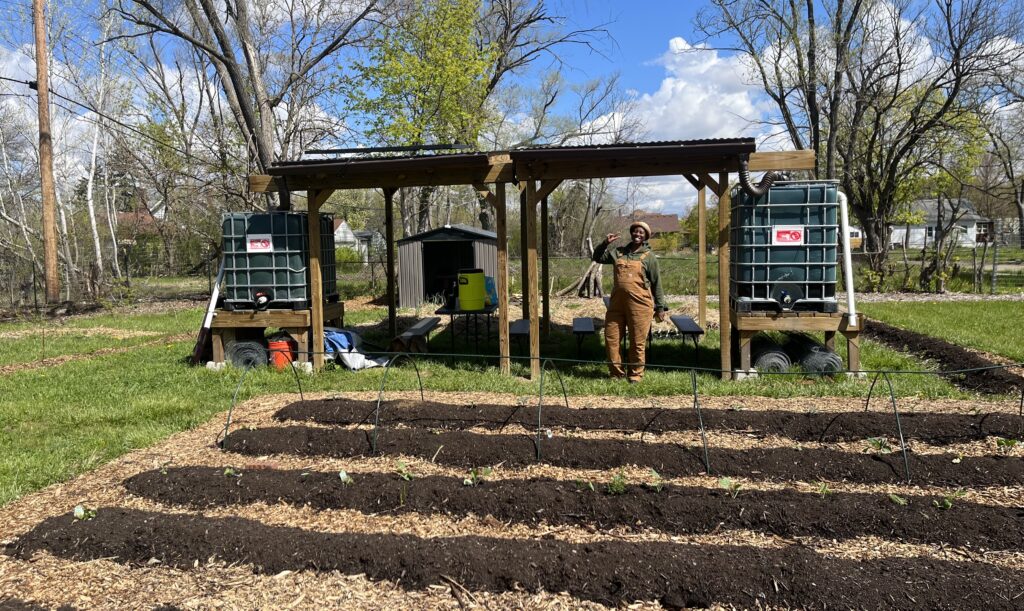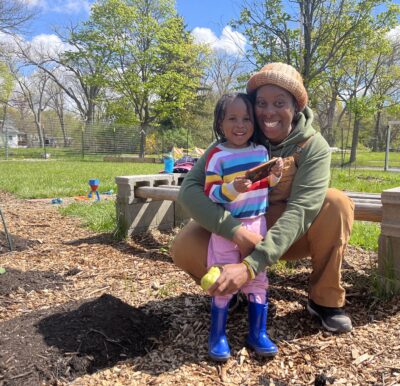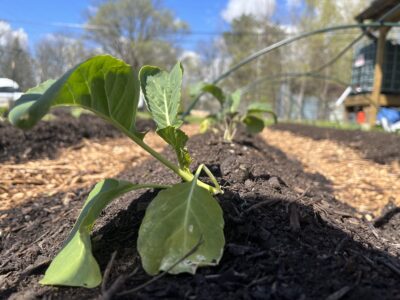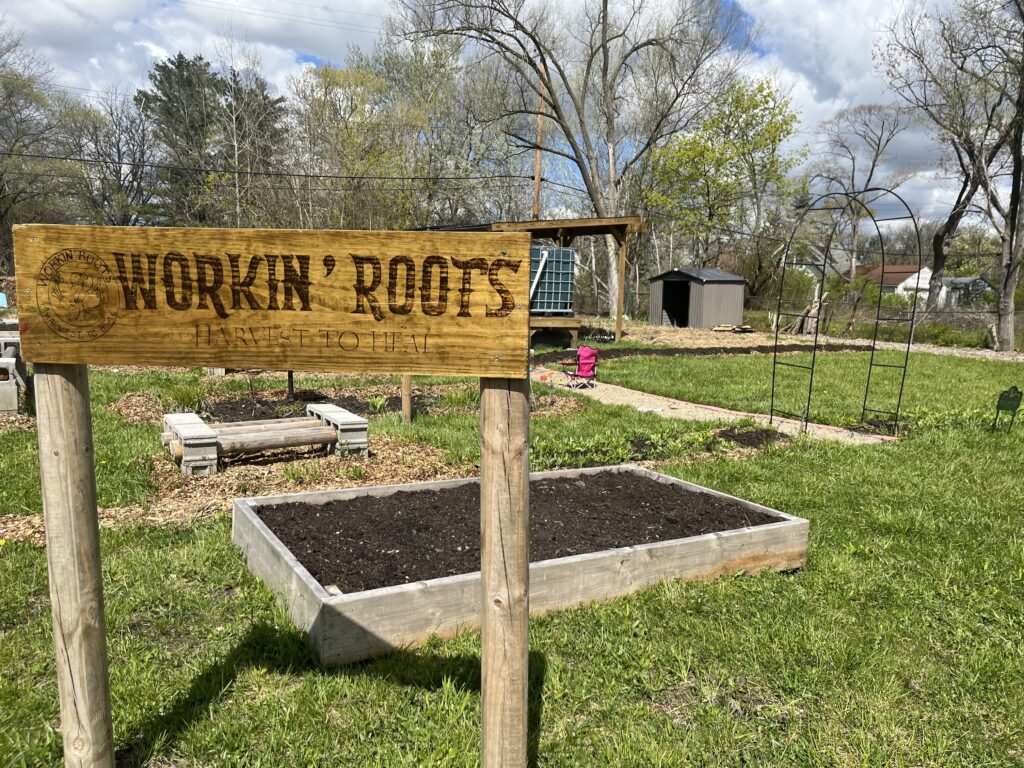Growing Food & Black Land Ownership in Detroit

Article and photos by Sarah Craft
I visited Candius Elliott’s farm, Workin’ Roots, the first week of May. It was finally sunny and warm after days of rain – we couldn’t have picked a better day to meet. Pulling up to the farm, located on a quiet side street in the Nolan Neighborhood of north Detroit, was immediately calming. There was no traffic noise, just a blue jay and house sparrows singing into the morning.
Candius had recently transplanted an assortment of cold crops she got through Keep Growing Detroit’s Urban Garden Resource Program and her youngest daughter, three-year-old Orchid, was excited to show off the new plants to a stranger. “Look!” she shouted as I walked up, smiling and pointing at the baby kale.
Workin’ Roots currently sits on two formerly vacant lots near John R and W State Fair and Candius plans to acquire four additional surrounding lots later this year. She’ll build a children’s sensory playscape with an edible food forest, a plot for cut flowers to help sustain the farm, a pollinator habitat, and more.
“This is my baby,” Candius looked around at what she’s created. “My labor of love. ”


There are 3.4 million farmers in the United States and 95 percent of them are white. Black farmers today are rare and just one percent of them own the land they farm on. But 100 years ago, 14 percent of farm owners were Black and their land had a value of over $185 billion in today’s dollars.
Black farmers have lost 12 million acres of farmland due to strategic and racist acts by the government and wealthy white farmers over the last century. There’s a 2019 article in The Atlantic called The Great Land Robbery that details the 100-year effort if you want to learn a whole lot more. The land grab accelerated from 1950 to 1969 and Black farmers’ land was taken from them by “an average of 820 acres a day—an area the size of New York’s Central Park erased with each sunset.”
Candius is a Black woman who owns the land she farms on. She’s an anomaly when looking at a national scale. But in Detroit, she’s part of a growing population of Black farmers who own their land, thanks, in part, to the Detroit Black Farmer Land Fund (DBFLF).
DBFLF is a collaboration of the Detroit Black Food Security Network, Oakland Avenue Urban Farm, and Keep Growing Detroit that launched on Juneteenth in 2020. Their mission is to rebuild intergenerational land ownership for Black Farmers in Detroit and they’re doing it lot by lot. As of October 2022, DBFLF has made 120 awards to Black farmers, totaling nearly $275,000, and has helped more than 50 Black growers, like Candius, become landowners. Last year, MFF recognized DBFLF leaders as one of our MFF Community Trailblazer recipients and contributed $10,000 to their efforts. DBFLF leaders – like the Black farmers they work with – are entrepreneurial, innovative, hardworking, and outcome-driven. They’re founders, just like MFF’s members.
Candius received a grant from DBFLF in 2021 and used it to purchase her two lots from the Detroit Land Bank Authority to start Workin’ Roots. She got a second, smaller, grant last year to support some of her farm’s infrastructure, and she hopes to gain a bit more support from DBFLF this year to jump-start the projects on the new lots she’s purchasing.
Most DBFLF awards have averaged between $1,000 and $2,000 per farmer. This year, the collaborative is hoping to increase the amount available since, like everything else, land and material costs are increasing. DBFLF is actively seeking donations to increase award amounts and they’ll open the grant process for Black Farmers on Juneteenth. Awardees will be announced at the annual D-Town Farm Harvest Fest this fall.

“Being able to own land is everything,” Candius said. “So much has been taken from BIPOC people, especially land. If you don’t have land, what do you have? You have nowhere to go; you have nowhere to grow; you have nowhere to just be.”
Candius is a full time mother and farmer and she strives to live a life that’s both sustainable and balanced. Her plan is to keep a third of what she grows to feed her family, sell a third to sustain the farm, and offer a third for free to support her community.
Although the Nolan neighborhood has lots of vacant land, there are 5,000 people who live there. Candius isn’t from the neighborhood but she said she’s done her research: 15 years ago, her land and the surrounding lots had occupied homes on them. Then the houses sat vacant. Then the houses were demolished. And then the land sat empty and became blighted by illegal dumping.
Slowly, the neighborhood has become a place for Black farmers – Liberated Farms is across the street and Rescue MI Nature Now sits just a few blocks away.
“We’re rebuilding community,” Candius said. “We’re reclaiming what was taken from us. We’re the healthiest, the most free, the most alive when we’re growing our own food and communing with each other.”
Candius has a long growing season ahead of her, especially with another baby on the way. Workin’ Roots grows raspberries, kale, sunflowers, garlic, elderberry, turnips, tomatoes, strawberries, mint, basil, melons, salad mix and so much more. Candius hosts weekly programs – like yoga, mediation, and emotional wellness – throughout the summer and encourages neighbors to stop by, join the programs, and harvest some food.
“I am the most grounded in being outside. It’s very uplifting,” Candius said. “Sometimes I come out here to just sit and feel the wind.” Orchid was playing with some pebbles on the path and ran over for help getting one out of her shoe. We paused to feel the wind and listen to the squawking blue jay in the trees above.
“I feel most connected to my higher self, to my family, to my community the more I’m outside and the more I put my hands in the earth. As an urban farmer, I’m giving farming a new perspective and helping heal the traumas of our people. I’m starting to feel that healing. We’re repairing a lot of harm.”
—
To stay updated on events and crops for sale, follow Workin’ Roots on Instagram @WorkinRoots. To learn more about Detroit Black Farmer Land Fund or to make a donation to their fund, visit their website or reach out to MFF for an introduction to one of the founding members and MFF Community Trailblazer Awardees.

